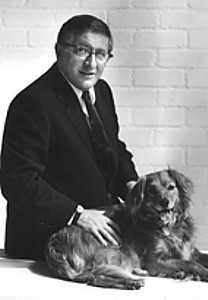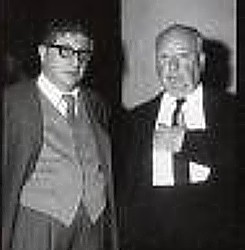The movie music that makes you perk up
The Echoing Genius of BERNARD HERRMANN

dog, who seems a lot happier with
the great composer than does
Alfred Hitchcock,
while posing with Herrmann.
A few nights ago I was watching On Dangerous Ground, Nicholas Ray's 1951 film that cast Robert Ryan as a brutal cop who falls in love with a blind Ida Lupino. The sentimental script beggars belief but I found myself drawn to the music on the soundtrack. Those sonorities were familiar and identifiable.
I discovered the next day in a web search that the music came from the pen of Bernard Herrmann, the man who had scored Citizen Kane and went on to compose for a long run of Alfred Hitchcock classics, including Vertigo, Psycho, North by Northwest and Marnie.
Filtering out the music from a movie experience is rare for any moviegoer, including me. Movie music is intended as a subliminal experience, written to boost emotions on the screen, not survive in the memory or be performed in isolation.
But Herrmanns scores were different. Over the past few weeks I have heard his works on French classical music radio three times--bits of his Psycho and Marnie music and the wild fandango overture to North by Northwest. Major orchestras in the U.S. and Europe are playing his works to attract new audiences.
Herrmann died in 1975 a wealthy but bitter and unhappy man, rejected both by his former friend Hitchcock and by the classical world. If he is experiencing a comeback now, he is still not quite where he always wanted to be. At best he ranks as a crossover artist, bridging pop culture and the world of serious music. He wanted to be better than that.
Nevertheless, he left his mark, writing the music for 50 movies over a span of 35 years. The list runs the gamut of output from B movies (Its Alive, The Night Digger) to such Hollywood classics as the Hitchcock oeuvre and Orson Welles best films to Cape Fear and Taxi Driver. He also made television history with his theme for The Twilight Zone.
His style has influenced a new generation of film composers, acknowledged by Danny Elfman and Michael Kamen, and spawned dozens of inferior imitators. His scores have been revived in remakes of Cape Fear and Psycho and most of his work has been reissued on CD and performed live around the world.
Welles credited his Citizen Kane score for being 50 percent responsible for the films artistic success.

and Hitchcock ended in a stormy
dispute over Herrmann's rejected
score for "Torn Curtain."
Benny Herrmann knew exactly what he was doing. As he once said at the peak of his career, movie music is the communicating link between the screen and the audience, reaching out an enveloping all in one single experience.
He also knew his limitations. As he told his first wife, Lucy: I feel that I am not possessed of a great talent . Perhaps in the end I am not a real composer perhaps just one who will always have been on the fringes of real art.
I have long been aware of Herrmanns tortured journey through life but only recently was moved to read his definitive biography, A Heart at Fires Center by Steven C. Smith. I was surprised to see what tumult he had caused before and after his Hitchcock phase. He bounced between Los Angeles and New York for most of his professional life, striving to be recognized as a major conductor and composer. He achieved neither. Although he rose to become music director of the CBS Symphony as a young man, he was sacked along with the rest of the orchestra when it was disbanded in 1939. Hollywood was all that was left to him after that.
Herrmanns personal relationships were strained by his volatility. Episodes of screaming in public restaurants and gratuitous insults to his accomplished colleagues made people wary of him. Tales of his behavior read like a textbook description of bipolar disorder.
Recalled MGM head of music John Green in the Smith book, I think Benny Herrmann committed suicide. Unwittingly; not with drugs, not with a pistol, but with a four-letter word called hate. I am convinced he filled his life with unneeded stress and tension.
Smith points out that some of Herrmanns strong-mindedness served him well. Perhaps his most-imitated music is the passage of shrieking violins in the shower scene from Psycho. Hitchcock wanted that to be a silent scene but Herrmann ignored the instructions and made movie history.
But Herrmann asserted himself once too often when he produced a traditional score for Torn Curtain despite Hitchcocks suggestion that he shift into more trendy music. In a well-known confrontation, Hitchcock interrupted a run-through of the score, scolding Herrmann in front of his orchestra for producing exactly what I didnt want. Hitchcock paid Herrmann off but never worked with him again.
Herrmanns unhappy life is best summed up in his own words. As he wrote in a response to a fan letter:
Composing music for film (and television) is in many ways a very unrewarding artistic endeavor. So often ones efforts are scarcely even noticed, not because the music is unworthy, nor that the picture may be more or less successful, but because it is frequently just taken for granted.
